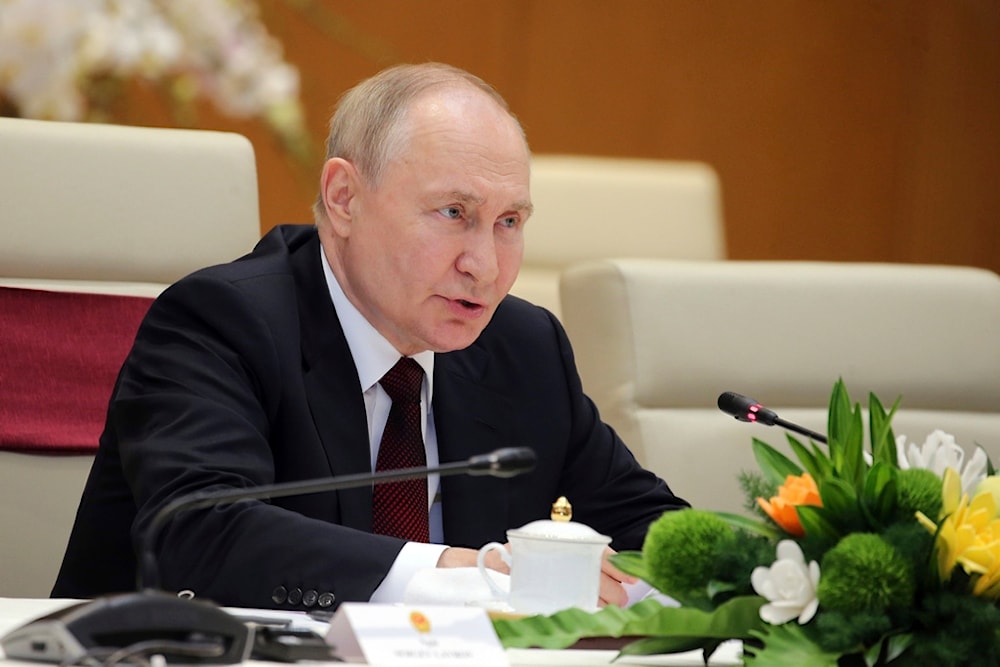Russia contemplating change in nuclear doctrine: Putin
The Russian head of State dismissed the necessity of a preemptive nuclear strike clause in Russia's doctrine as he expressed confidence in Russia's capability to respond effectively to any aggression with a retaliatory strike.
-

Russian President Vladimir Putin speaks to Vietnamese Prime Minister Pham Minh Chinh during a meeting at the government office in Hanoi, Vietnam Thursday, June 20, 2024 (AP)
Russian President Vladimir Putin announced on Thursday that Russia is contemplating revisions to its nuclear doctrine in response to recent developments in Western strategic thinking that could lower the threshold for using nuclear weapons.
Speaking at a press conference during his visit to Vietnam, Putin expressed concerns over emerging technologies, including ultra-low power nuclear devices, being discussed in Western expert circles.
"Now we are also thinking about what and how could be changed in the nuclear doctrine, in the strategy. And it is connected with this. It is connected with the fact that there are new — in any case, we know that the probable enemy is working on it — new elements related to lowering the threshold for the use of nuclear weapons," Putin said.
Putin dismissed the necessity of a preemptive nuclear strike clause in Russia's doctrine as he expressed confidence in Russia's capability to respond effectively to any aggression with a retaliatory strike.
Read more: Putin arrives in Vietnam for state visit condemned by US
In a separate development, Putin addressed the recently signed Comprehensive Strategic Partnership Treaty with DPRK, clarifying that the treaty largely replicates the terms of its predecessor from 1962.
The treaty's importance lies in providing mutual assistance against armed aggression, he said, stressing its relevance in contemporary geopolitical contexts, particularly amid tensions with South Korea.
"The Korean crisis has such a smoldering character, but we assume and hope that our agreements with the DPRK will be a deterrent to a certain extent to prevent this crisis from escalating into some kind of burning phase," Putin told reporters.
Putin also criticized international sanctions on DPRK, likening them to the inhumane siege of Leningrad during World War II, citing their impact on civilians' livelihoods and rights.
"You can treat the regime as you would like, but to impose sanctions on the right to immigration, it seems strange," Putin said. "It leads to families, even if they are in difficult material circumstances, to lack the opportunity to earn money somewhere and feed their children. Doesn’t it remind you of something? Isn’t it inhumane?"
Elsewhere in his remarks, Putin acknowledged the failure of behind-the-scenes talks with Western counterparts on the Ukrainian crisis, indicating Russia's readiness to engage in diplomatic discussions but proceeding from the current situation on the ground.
Read more: Russia, DPRK committed to mutual aid in case of armed aggression
Addressing recent military developments, Putin labeled the shelling near Belgorod with long-range weapons as aggressive, noting Russia's ongoing evaluation of the situation and clarifying that advancing towards Kharkiv is not Russia's objective.
Putin further asserted Russia's readiness to supply arms to other countries in response to Western arms transfers to Ukraine, citing Russia's agreements, including those with DPRK, as grounds for potential actions.
"Those who are supplying these weapons believe that they are not at war with us, well, I have said, including in Pyongyang, that we reserve the right to supply weapons to other regions, bearing in mind our agreements with the Democratic People's Republic of Korea, I don’t rule out this as well, where will these [weapons] go," Putin said.

 3 Min Read
3 Min Read








